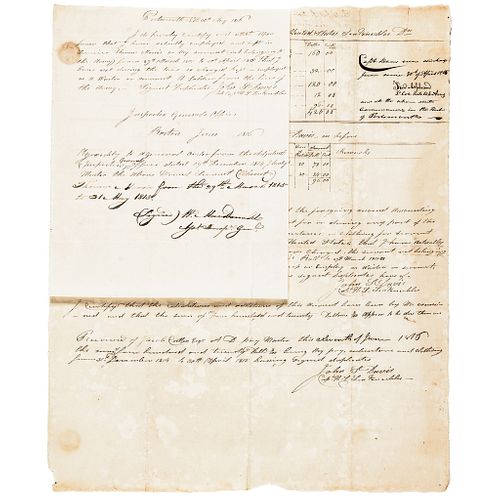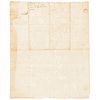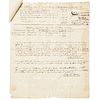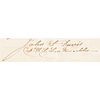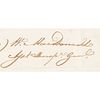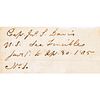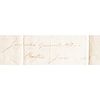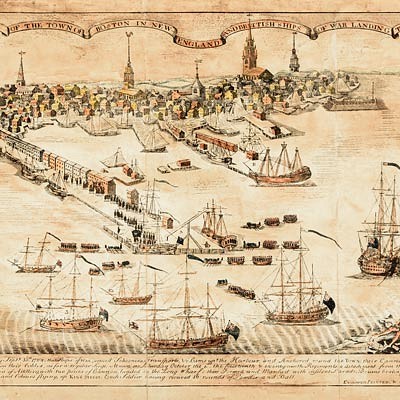(WAR OF 1812) Lt Colonel Timothy Upham a.k.a. The Hero of the Seige of Fort Erie
Lot 215
Categories
Estimate:
$600 - $800
Absentee vs Live bid
Two ways to bid:
- Leave a max absentee bid and the platform will bid on your behalf up to your maximum bid during the live auction.
- Bid live during the auction and your bids will be submitted real-time to the auctioneer.
Bid Increments
| Price | Bid Increment |
|---|---|
| $0 | $10 |
| $200 | $20 |
| $300 | $25 |
| $500 | $50 |
| $1,000 | $100 |
| $2,000 | $200 |
| $3,000 | $250 |
| $5,000 | $500 |
| $10,000 | $1,000 |
| $20,000 | $2,000 |
| $30,000 | $2,500 |
| $50,000 | $5,000 |
| $100,000 | $10,000 |
| $200,000 | $20,000 |
| $300,000 | $25,000 |
| $500,000 | $50,000 |
About Auction
By Early American History Auctions
Mar 20, 2021
Set Reminder
2021-03-20 12:00:00
2021-03-20 12:00:00
America/New_York
Bidsquare
Bidsquare : Autographs-Colonial-Political-Americana
https://www.bidsquare.com/auctions/early-american-history-auctions/autographs-colonial-political-americana-6509
330 Lots of Rare, Historic Autographs, Americana, Civil War Era, George Washington, Abraham Lincoln, Slavery & Black History, Revolutionary War Era, Colonial America, Federal Period, War of 1812, Colonial Currency, Indian Peace Medals & more... Early American History Auctions auctions@earlyamerican.com
330 Lots of Rare, Historic Autographs, Americana, Civil War Era, George Washington, Abraham Lincoln, Slavery & Black History, Revolutionary War Era, Colonial America, Federal Period, War of 1812, Colonial Currency, Indian Peace Medals & more... Early American History Auctions auctions@earlyamerican.com
- Lot Description
War of 1812
Lt. Colonel Timothy Upham, a.k.a. "The Hero of the Seige of Fort Erie" War of 1812 Signed Document for John Davis, the late Captain of the "U.S. Sea Fencibles" for Service Pay
(WAR OF 1812), Two-Part Manuscript Document, Signed by Lt. Colonel Timothy Upham, a.k.a. "The Hero of the Seige of Fort Erie," for the late Captain John Davis' "U.S. Sea Fencibles" Service Pay, Choice Extremely Fine.
December 31, 1814 to April 30, 1815-Dated Infromation in this large two-part Document. Lt. Colonel Upham confirms the service of John Davis, the late Captain of the "U.S. Sea Fencibles" and his request for pay. "Sea Fencibles" applied to the seafaring men who protected the cities of Baltimore, Boston, New York, Norfolk, and Philadelphia between 1813 and 1815. The United States "Sea Fencibles" only existed from July 26, 1813 to February 27, 1815 when Congress repealed the Act and then replaced it with the Corps of Sea Fencibles. Davis' request includes payment for his personal assistant, clothing and susbsistence for the period. This Document measures an impressive 17.35" x 13.25" and is accomplished on fine, laid period paper with a large crowned (British) watermark. Signed twice by Davis, once for the pay request and again for receipt of the payment. In the upper right corner, Lt. Colonel Timothy Upham of the U.S. Army writes and Signs a short note confirming Davis' military service.
A Second Document (apparently a later, handwritten wove period cover letter), is attached to the former with a small wax seal. It is confirmed by the signature, "W. MacDonald, General" Angus William McDonald (1799 - 1864). This is the first time we have offered Lt. Colonel Uphams' autograph.
Sea Fencibles applied to the seafaring men who protected the cities of Baltimore, Boston, New York, Norfolk, and Philadelphia between 1813 and 1815.
This little known Congressional Act passed by Congress on July 26, 1813 during the War of 1812 between the United States and Britain allowed for ten separate companies to protect the ports and harbors of the United States. The officers received monthly pay, rations, and uniforms. The pay ranged from $23 on the low end to $40 for Captains.
The enlisted Sea-Fencibles who were generally boatswains, gunners, and privates received pay that ranged from $12 for privates up to $20 for a boatswain. The United States sea fencibles only existed from July 26, 1813 to February 27, 1815 when Congress repealed the act and then replaced it with the Corps of Sea Fencibles.
John S. Davis, Captain, New Hampshire, June 27, 1814.
Timothy Upham (September 9, 1783 - November 2, 1855) was an American soldier in the War of 1812. At the Siege of Fort Erie while he was in command of his regiment, he did gallant service with his regiment, in going to the rescue, by special order of General Jacob Brown, of General Miller.
In June 1811, he was appointed, by Governor John Langdon, one of his aids, with rank of lieutenant colonel. He continued in business as a merchant until 1812, when, in anticipation of a war with Great Britain, he was commissioned as major of the 11th U.S. Infantry on March 12, of that year. In June following he was appointed to command the detachment of troops from New Hampshire ordered to garrison Fort McClary in Portsmouth Harbor, by Governor William Plumer.
In September he joined his regiment at Plattsburgh, New York, January 15, 1813, he was ordered to Portland as superintendent of the recruiting district of Maine. In the spring he joined his regiment, and was detailed to command a battalion which was to join Gen. Hampton's army preparing to attack Montreal.
On this futile expedition, Major (now Lieutenant-Colonel) Upham fought his battalion with credit at the Battle of Crysler's Farm. Just before this expedition he had been promoted to the lieutenant-colonelcy of the 21st Regiment on March 12, 1813.
On September 14, 1814, he was in command of his regiment, at the "sortie of Fort Erie," and did gallant service with his regiment, in going to the rescue, by special order of Gen. Jacob Brown, of its former gallant commander, General Miller. At the close of this campaign, with impaired health, Col. Upham was ordered upon recruiting service.
At the close of the War of 1812 he resigned his commission and was honorably discharged on June 15, 1815. In 1816 was appointed Collector of Customs at Portsmouth, and continued in that office for thirteen years. On May 15, 1819, he was appointed Brigadier General of the 1st Brigade, 1st Division New Hampshire Militia, and later was promoted to Major General of the Division on May 19, 1820, upon the resignation of General Clement Storer. He resigned May 13, 1823.
General Angus William McDonald (February 14, 1799 - December 1, 1864) was a 19th-century American military officer and lawyer in the U.S. state of Virginia. He also served as a colonel in command of the Confederate States Army's 7th Virginia Cavalry during the American Civil War.
McDonald was appointed to serve in a number of prominent political positions including a superintendent overseeing the construction of the Northwestern Turnpike and a commissioner representing Virginia in its boundary dispute with Maryland. McDonald was the grandson of Virginia military officer and frontiersman, Angus McDonald (1727-1778)
Our Auction Contents:
Black History & Slavery: (Lots 1 - 63)
Abraham Lincoln Related: (Lots 64 - 74)
Historic Autographs: (Lots 75 - 235)
Colonial America: (Lots 236 - 261)
Revolutionary War: (Lots 262 - 304)
George Washington Related: (Lots 305 - 306)
Early American Guns & Weapons: (Lots 307 - 318) - Shipping Info
-
Early American provides in-house worldwide shipping. Please contact us directly if you have questions about your specific shipping requirements.
-
- Buyer's Premium



 EUR
EUR CAD
CAD AUD
AUD GBP
GBP MXN
MXN HKD
HKD CNY
CNY MYR
MYR SEK
SEK SGD
SGD CHF
CHF THB
THB